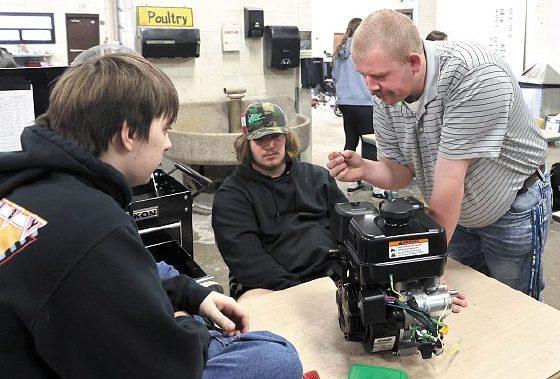
2 minute read
TA LK ING SHOP Sycamore teachers offerhands-onexperience
By SHANE TAYLOR | staylor@shawmedia.com
Ona recent Monday, students crowded into aclassroom at Sycamore High School to learn how to build asmall engine.
The laboratory class, part of the school’s agriculturaldepartment offerings, gave studentsalookatthe components of amotor andwhat toolstouse to piece it together.The agricultural departmentatSycamore High School givesstudents achance to learn outside the traditional classroom setting.
“I think there is astigma around the agricultural name and department, but agriculture is so much more now than what it used to be,” said Kara Poynter, chairman of the agricultural department at Sycamore High School. “It can be communications, finance, business, anditcan be engines, welding and stuff like that.”
In herrole, Poynter also oversees the high school’s career and technical education classesfor studentswho might pursue avocation. Thedepartment, shesaid, allowsstudents to gain hands-on experience by teaching them to apply skills through science, mechanics, technology and horticulture.
In SycamoreHighSchool’s career and technical education program, part of the agriculture department, three teachers oversee about 15 classes, juggling 300 students, depending on the semester. Theclass instruction on buildingasmall engine is part of that curriculum.
The classes at Sycamore are just for credit, Poynter said. But the experience allows studentstograsptasks they may be asked to do after graduation, whether in careers or in life.
“In our department, we have classes that cover science, speech and consumer economics credit,” she said.
See TALKING SHOP, page 8
•TALKING SHOP
From page 7
For almostacentury, students at Sycamore High School have tackled tactile learning through avariety of ways that offerinsight into the importance of nontraditional work, Poynter said. It’s a fitting vocation for many in DeKalb County, who might stemfrom amore rural background and find familiarity in the work.

“We have our kids who are more interested in agricultural and come from an ag background,” Poynter said. “And thenwealsohave kids who are more CTE [careerand technical education]path.”
Theprogram was founded at the high school in 1929, one year after the National Farmers of America was formed.The national organization is a nonprofit501(c)(3) youth organization that’sfocused on CTE and agriculture education in middle and high schools.
Poynter’s colleague Christian Thurwanger teaches most of the CTE classes.
“A lot of the kids in his classes are going intoa trade school,orsome of them aregoing right to on-the-job training,” Poynter said.
“Lotsofhours,” Thurwanger saidas he described overseeing technical edu- cation labs duringthis past semester amid aCOVID-19 surge, where the shop class was opened once or twiceafter school.
“We did construction at home where they built stick houses,”Thurwanger said. “Normally, we do actual walls but we ended up doing those as amakeup activity.”
Connor Wright, asophomoreatthe school, said with the experiencehe’s gained in his shop class, he’s looking forward to exploring trade options once he graduates.
“He’sa younger guy, so it’s easy to hang out around him, very outgoing and makes it afun class,” Wright said of Thurwanger. “First half of the first quarter we did woodworking. We then moved into electrical and plumbing, we did some welding, and now we are into engines.”
For Poynter, having the support of Sycamoredistrict’sadministration allowed the program to grow and reach more Spartans.
“We’re lucky,” he said.“We have a really good board of education, superintendent and admin support for what we do, whichiswhy Ihave been able to growfromone persontothree.They understand the importance to the trades and of the ag program.”







